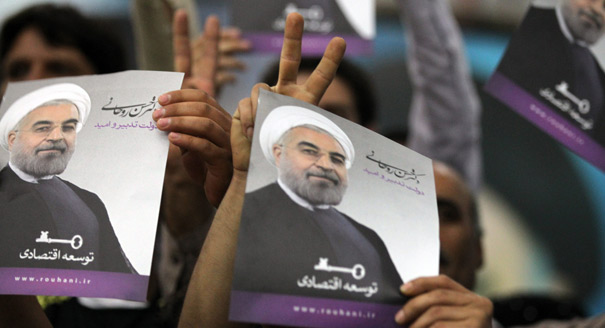Dmitri Trenin
{
"authors": [
"Dmitri Trenin"
],
"type": "commentary",
"centerAffiliationAll": "",
"centers": [
"Carnegie Endowment for International Peace",
"Carnegie Russia Eurasia Center"
],
"collections": [],
"englishNewsletterAll": "",
"nonEnglishNewsletterAll": "",
"primaryCenter": "Carnegie Russia Eurasia Center",
"programAffiliation": "",
"programs": [],
"projects": [],
"regions": [],
"topics": []
}
Source: Getty
Rowhani’s Election: Iran’s Regime Passes A Crucial Test
In the foreseeable future, Iran’s neighbors, partners, and adversaries will have to deal with an Iran which is more united internally, more flexible at the tactical level, but strategically as determined as ever to be the dominant regional player. With Rowhani as president, it will be more difficult to present the Iranian leadership as irrational or unreasonable.
As a result of Rowhani’s election, the Iranian political system has won a new lease on life. The Supreme Leader Khamenei, who had feared a repetition of the 2009 Green Movement demonstrations, managed to accommodate the yearning for change without undermining the stability of the Islamic republic. As a consequence, some internal rebalancing within the very complex political edifice of the Islamic republic is likely. This may not be a smooth process, but once completed it will make the system as a whole better adapted to the changing domestic and international realities.
Rowhani’s election will not mean the end of the Iranian nuclear program, or even its suspension. For Iranians, mastering nuclear energy has become a national idea. Their leaders probably also want to acquire a nuclear weapons capability, so that even without actually producing a weapon, they can deter their adversaries. As things stand today, the maximum concessions the international community can offer Iran fall short of the minimum requirements of Iran’s nuclear policy. Rowhani is of course an able negotiator, but Khamenei remains the decider. Iran definitely needs an easing of sanctions, but any hope for an early agreement should be dropped.
Rowhani’s presidency begins amid enhanced regional tensions. Since 2011, Iran has been involved—alongside Saudi Arabia—in the conflict in Syria, which can be described as a proxy war between Tehran and Riyadh, in which the Alawite/Shia forces are pitted against the Sunnis. There is no prospect for an early cease-fire and the beginning of the political process in Syria, the more so that Saudi Arabia, supported by the Obama Administration, rejects any notion of involving Iran into the negotiations process on Syria. In the near future, the war will intensify, raising regional tensions still higher.
In the foreseeable future, Iran’s neighbors, partners, and adversaries will have to deal with an Iran which is more united internally, more flexible at the tactical level, but strategically as determined as ever to be the dominant regional player. With Rowhani as president, it will be more difficult to present the Iranian leadership as irrational or unreasonable. Supreme Leader Khamenei has successfully passed a difficult test. The renewed Islamic regime is now a challenge to the leaderships in the United States, Israel, and elsewhere.
About the Author
Former Director, Carnegie Moscow Center
Trenin was director of the Carnegie Moscow Center from 2008 to early 2022.
- Mapping Russia’s New Approach to the Post-Soviet SpaceCommentary
- What a Week of Talks Between Russia and the West RevealedCommentary
Dmitri Trenin
Recent Work
Carnegie does not take institutional positions on public policy issues; the views represented herein are those of the author(s) and do not necessarily reflect the views of Carnegie, its staff, or its trustees.